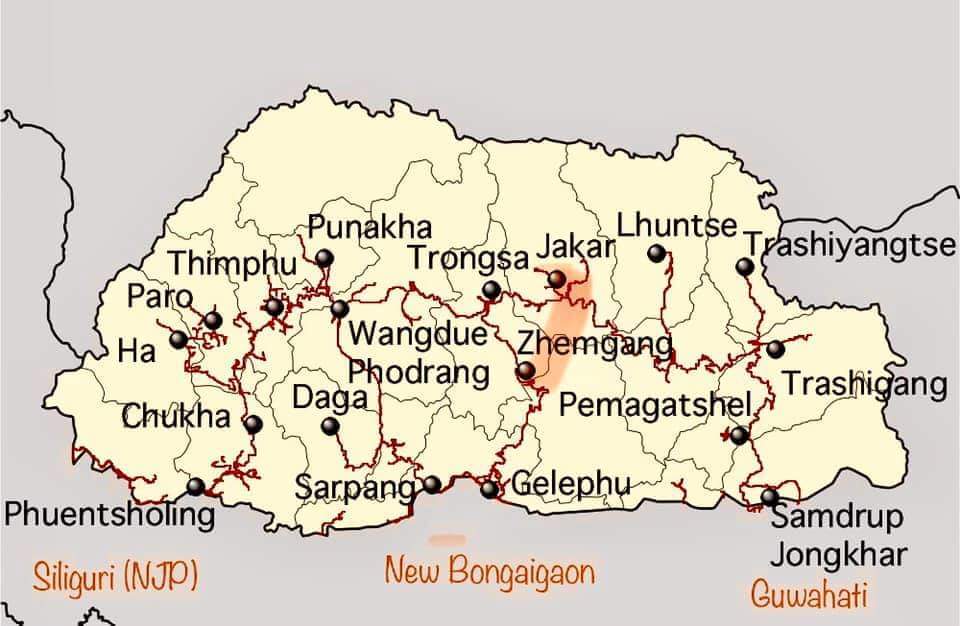Bhutan Travel Guide

Introduction: Popularly Known as “Land of Thunder Dragon” In global tourism map Bhutan is small Buddhist country Which is Border with India in the South and with China in the North. Currently Countrys total populations less than 8 lakh Bhutan measures its growth with GNP (Gross National happiness). In Asia Only North Korea accept fewer guest than Bhutan.
Bhutan believe in “HIGH VALUE LOW IMPACT” tourism policy . As the country does not want to allow the growth of tourism at the cost of its tradition , culture , heritage , with Rich bio – diversity and pristine mother nature , With the Monasteries , Fort, River , Forest and culture it is the Most elusive destination for every traveller across the globe.
Northeast Travels is bringing out a comprehensive Bhutan travel guide for people planning to travel Bhutan in future.
.
Area – 38,394 Sq Km
Official Language – DZONGKHA
Capital – THIMPU
Currency – The Ngultrum (Nu) is at par with the Indian Rupee
VISA : Except citizen from INDIA , BANGLADESH & MALDIVES, all other Country’s citizen needs VISA before entering / travelling to Bhutan which you can obtain through registered and authorised Tour operator approved by Bhutan Tourism Council. The VISA would be processed only on the receipt of the advance of “Minimum Daily Tariff (MDT)” Calculate base on the duration of your stay at Bhutan. Currently VISA charge is 40 US Dollar and 16 US Dollar for extension. For VISA you need to submit your passport with the validity of at least 6 months your air ticket through register tour operator approved by Bhutan tourism council. For foreigner there is Mandatory Tourist fees which ranges from 200 USD to 250 USD depending upon season and off season . Students also get Special Discounts depending upon group sixe and duration of stay
Entry Fees : Currently there is no entry fees for the citizen of India , Bangladesh and Maldives till 30th June 2020. From 1st July citizen from INDIA , BANGLADESH & MALDIVES have to Pay Rs 1200 per Adult ( above 12 years) per day and Below That Rs 600 Per Head Per day as a Sustainable Development fees. out of 33 Districts 20 districts are exempt from Entry fees .
The Country’s tourism sector divide into three parta 1) Western Bhutan which main entry through Paro / Phuntsolling) , 2) Eastern Bhutan which entry through Samdrup Jhongkar and 3) Central Bhutan entry through Gelephu
Entry Points – Visitor Can visit Bhutan either by AIR or By land , By Air Paro is the only International airport which is 65 Km from Capital City Thimpu and Time will Take to Reach Thimphu 2-2.5 years. Paro is connected with all Major cities from India and Abroad .
By Road:
Visitor Can entry at Bhuthan By Road from Three Points :

1) Phuntsolling – (Entry for western Bhutan) Most Popular entry points and Major gateway for Western Bhutan. Nearest Railway Station is Hasimara , Apart from This You Can reach Phuntsolling from New Jalpaiguri , Falakata , New Alipurduar or New Coachbihar Railwaty Station . Nearest Airport For Phuntsolling is Bagdogra .
2) Samdrup Jongkar (Entry For Eastern Bhutan) – Nearest Airpport and Railway station is Guwahati : The distance between the Guwahati airport and Samdrup Jongkhar is 110km. On leaving Guwahati early, one can reach Samdrup Jongkhar in a little less than two hours.by road. There is No entry Permit Till 2022 for Visit Eastern Part of Bhutan .
3) Gelephu ( Central Bhutan ) : Gelephu is one of the areas through which visitors can enter Bhutan overland through the Indian state of Assam and it is also a gateway to the Royal Manas National Park, the oldest nature preserve in the Kingdom of Bhutan. Nearest Railway station is New Bongaigaon (2 hr)and Nearest Airport is GUwahati (5 hr)
Season – March to June Is Peak Season.September October and November Attract Festive and Holiday and Moderate season.
Low season – December January February and Very Low season is July and August till 2nd week of September .
Some snapshot of Bhutan .
#Bhutan, #RegionalTourists & #TourismSDF: This has been one of the popular discussions within the regional tourism industry. Sharing some insights considering that every industry wants to contribute towards #sustainable development, especially when the #tourism industry is considering “carrying capacity of destinations”
1974 while formulating the tourism policy around “High value, Low volume”
1996 Bhutan Tourism Rules & Regulations##2009 Considering a target to increase tourists, including opening the country for “regional tourists” by 2012, the policy vision of “High value, Low impact” announced (regional tourists includes #Bangladesh, #India & #Maldives)
2012 The committee recommended about being mindful about the “carrying capacity of natural & cultural environment with tourist footfalls reaching one third of the country’s population”.
2014 Benefits of Tourism not spreading throughout the country, an issue which was tabled
2015 Discussions about Sustainable Development Fees
TourismSDF for regional tourists initiated##2017 Official communications through meetings discussing
TourismSDF
2019 Announcement of #TourismSDF made
2020 Tourism Levy & Exemption Bill confirms
TourismSDF for regional tourists, amounting to Nu1200 per night, equivalent to Indian Rs.1200 & 600 for children between 6 to 12 years in 9 districts (Chukha samtse , Thimpu , Punakha, Paro, Haa, Bumthang , Wangdhuphodrong, Ghasa, )of Bhutan. However, visiting the remaining 11 districts ( #Trashigang, #Trashiyangtze, #Mongar, #Lhuntse, #Dagana, #Sarpang, #Zhemgang, #Tsirang, #Trongsa, #Pemagatshel & #Samdrupjonkhar ) not attract any fees. Also that 3 entry & exit points are now open for regional tourists, #Phuentsholing, #Gelephu & #SamdrupjonkharIndo-Bhutan Friendship Association



Recent Comments